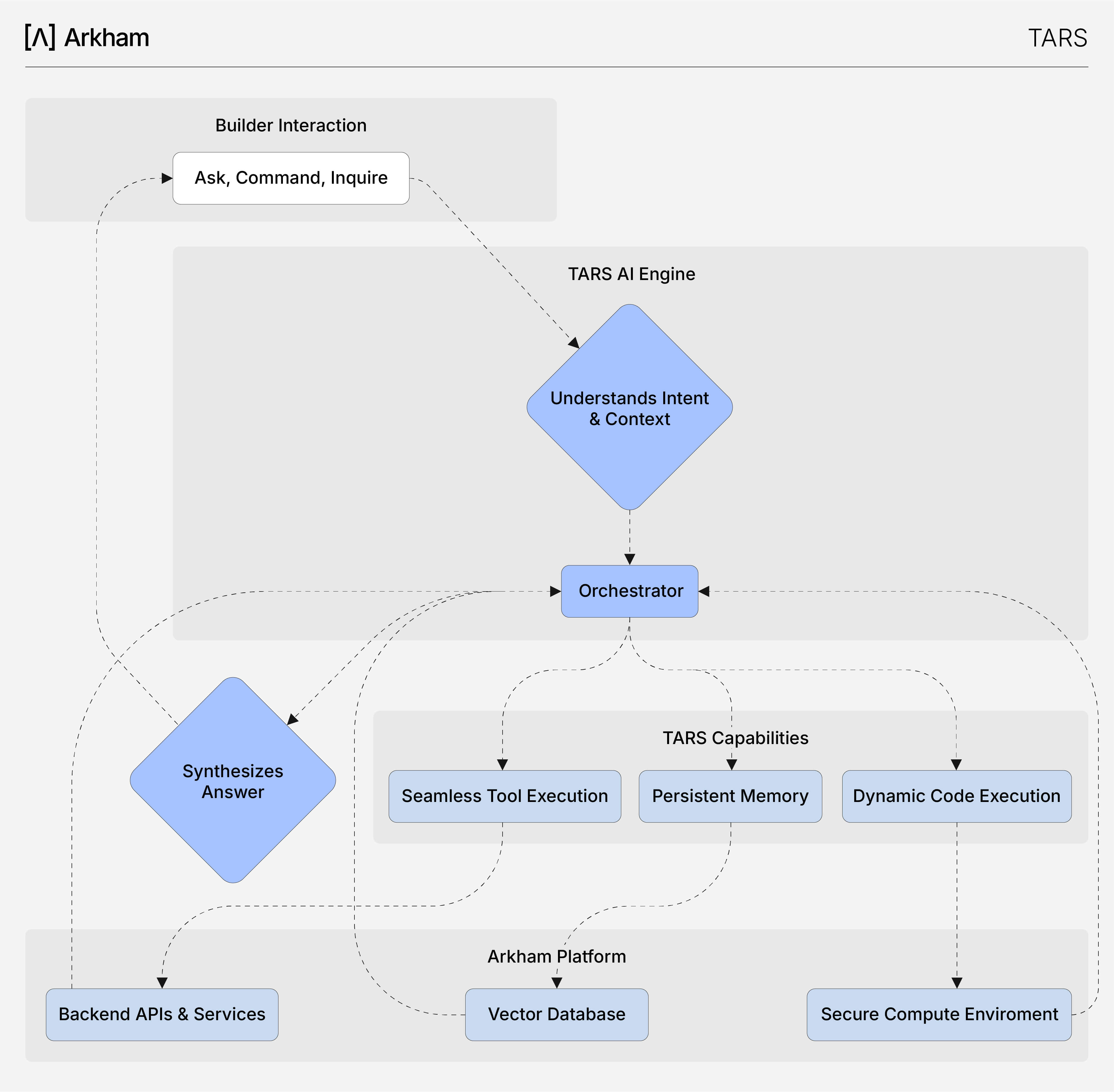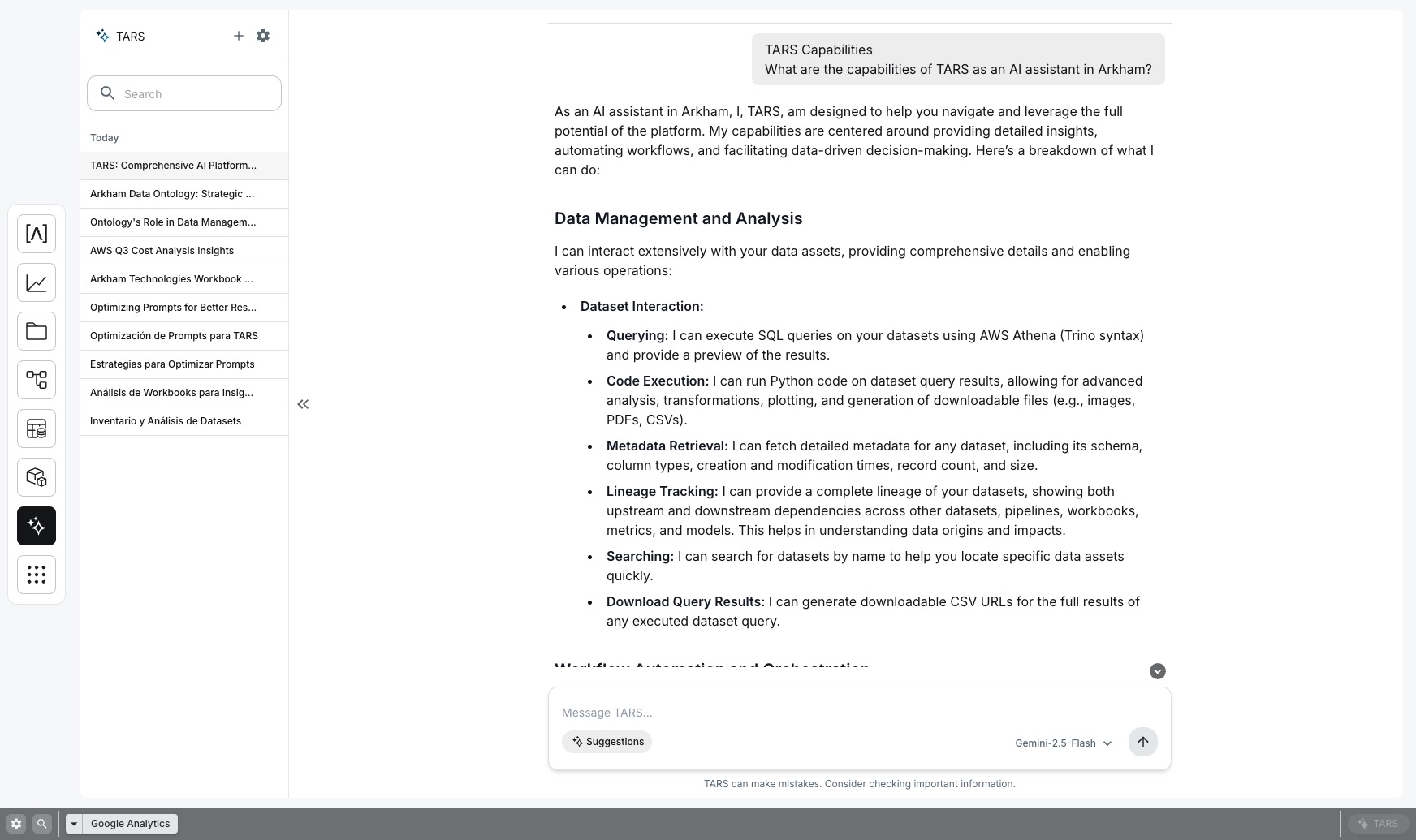TARS: Your AI Co-Pilot
TARS is not a tool you navigate to; it's an ambient, conversational partner integrated across the entire Arkham platform. It is designed to function like an expert-level extension of your team—always available, context-aware, and ready to accelerate your work. Whether you are building a pipeline, training a model, or exploring a dataset, TARS is there to generate code, answer questions, and perform actions on your behalf.
This page explains the core technology that allows TARS to be a powerful and versatile AI assistant.

TARS in Action: Your Partner Across the Platform
Before diving into the technical architecture, it's important to understand how you will experience TARS in your day-to-day workflows. TARS appears as an embedded assistant that provides proactive help tailored to the task at hand.
In this Component...
You can ask TARS to...
Pipeline Builder
"Generate a SQL query to join dataset_A and dataset_B on the user_id column."
ML Hub
"Load the customer_churn_training_data dataset and show me the distribution of the age column."
Data Catalog
"Show me the lineage for the production_orders dataset and what workbooks consume it."
Projects
"Create a new project named 'Q4 Financial Reporting' and add analyst@arkham.com as a 'Viewer'."
How TARS Works: The Engine Behind the Assistant
TARS's power comes from three core architectural pillars that work in concert to provide a seamless and intelligent experience.

1. Seamless Tool Execution: An Expert Platform User
TARS is equipped with an extensive and growing library of backend tools that allow it to interact with our Arkham platform just like a power user would. Based on your request, TARS dynamically selects and executes the appropriate tool, whether it's fetching details from the Data Catalog, checking the status of a Pipeline, or creating a new Workbook.
This extensibility means TARS's capabilities will grow alongside our platform, providing ever-increasing utility.
2. Persistent and Configurable Memory: A Partner That Learns
TARS is designed to learn from your interactions. Using its memorizer module, it can:
- Save Key Information: TARS can commit important facts, preferences, or findings from your conversation to a long-term vector memory. For example, if you often work on a specific project, you can tell TARS to "remember that my primary project is
Project_Alpha," and it will use that context in future interactions. - Analyze Conversations: It can review the history of your chat to understand the broader context of your work, leading to more relevant and insightful assistance over time.
This persistent memory makes TARS a true partner that becomes more attuned to your needs with every conversation.
3. Dynamic Code Execution: A Proactive Data Analyst
Perhaps TARS's most powerful feature is its ability to write and execute code in a secure environment. When you ask a question that can't be answered by a standard tool—like "What is the average order value for customers in Germany this quarter?"—TARS can:
- Identify the relevant
Production DatasetsorMetrics. - Write a precise SQL query to compute the answer.
- Execute the query in a secure, sandboxed environment.
- Return the answer to you in natural language, along with the query it used for full transparency.
This capability transforms TARS from an assistant into a proactive data copilot, capable of analysis, generating novel insights on the fly.
Secure and Governed by Design
All of this power is wielded safely. TARS operates with the same permissions as the logged-in user, meaning it can only see and do what you are authorized to. This ensures that every action is secure, governed, and fully auditable.
Related Capabilities
- AI Platform Overview: See how TARS is a core pillar of the AI Platform strategy.
- Data Platform Overview: Learn how TARS accelerates every step of the data workflow.
- ML Hub: Use TARS to write boilerplate code, explore data, and debug in a notebook.
- Pipeline Builder: Leverage TARS to generate complex SQL transformations from natural language.
- Data Catalog: Interact with TARS to discover datasets, trace lineage, and understand schemas.



